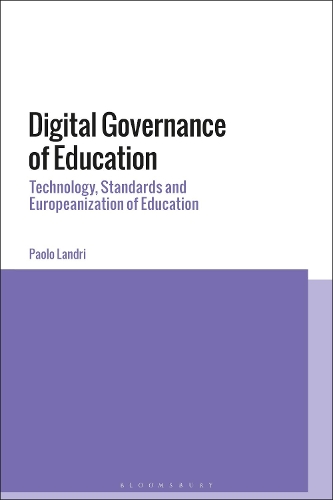
Digital Governance of Education: Technology, Standards and Europeanization of Education
(Hardback)
Available Formats
Publishing Details
Digital Governance of Education: Technology, Standards and Europeanization of Education
By (Author) Paolo Landri
Bloomsbury Publishing PLC
Bloomsbury Academic
20th September 2018
United Kingdom
Classifications
Tertiary Education
Non Fiction
Educational strategies and policy
371.200285
Physical Properties
Hardback
192
Width 156mm, Height 234mm
406g
Description
Digital Governance of Education explores the multiple ways in which digital technologies are changing the experience of education. With much of the contemporary education practice either taking place or being documented digitally, a huge amount of data is constantly being collected and analysed to give sophisticated and up-to-date accounts of education practice in contemporary societies. Such datafication of education, mediated through technology, gives rise to what the author defines as digital governance of education a transnational assemblage of people, technologies and policies that increasingly affects how national education systems are organized and managed. Paolo Landri argues that the emergence of digital governance is closely related to the new wave of standardization in education, exemplified by the shift towards what is measurable (for example focus on learning outcomes') and towards transparency in education practice - a shift that is both facilitated and augmented by digital technologies. The author places the digital governance of education within the framework of Europeanization of education, exploring how it contributes to the creation and regulation of European education arena through consolidation of digital space and tools introduced in this process (such as guidelines, country reports and online dashboards). Adopting a sociomaterial approach to education policy and drawing on actor-network theory, Paolo Landri uses empirical data to investigate how the digitization of education policy and practice is occurring in Italy, and to what extent it contributes to the growth of the digital governance of education. Pointing out the variety of risks and opportunities, he indicates future directions of critical research and the wider international implications of this global trend.
Reviews
Provides an up-close analysis of how digital technologies are reshaping education systems and schools across Europe and beyond. Through theoretically grounded and methodologically adventurous case studies, Paolo Landri provides the necessary critical cartography for future studies at an important new front in sociology of education. * Ben Williamson, Lecturer in Education, University of Stirling, UK *
Digital technologies are changing the worlds of education and their forms of governance and this timely book proposes a critical understanding of the digital governance of education. At the end of the journey, readers will be able to view the digital-era governance through different eyes and feel urged to give a different sense to their own experience of it. * Silvia Gherardi, Professor of Sociology, University of Trento, Italy *
Author Bio
Paolo Landri is Senior Researcher in the Institute of Research on Population and Social Policies at the National Research Council (IRPPS-CNR), Italy.
